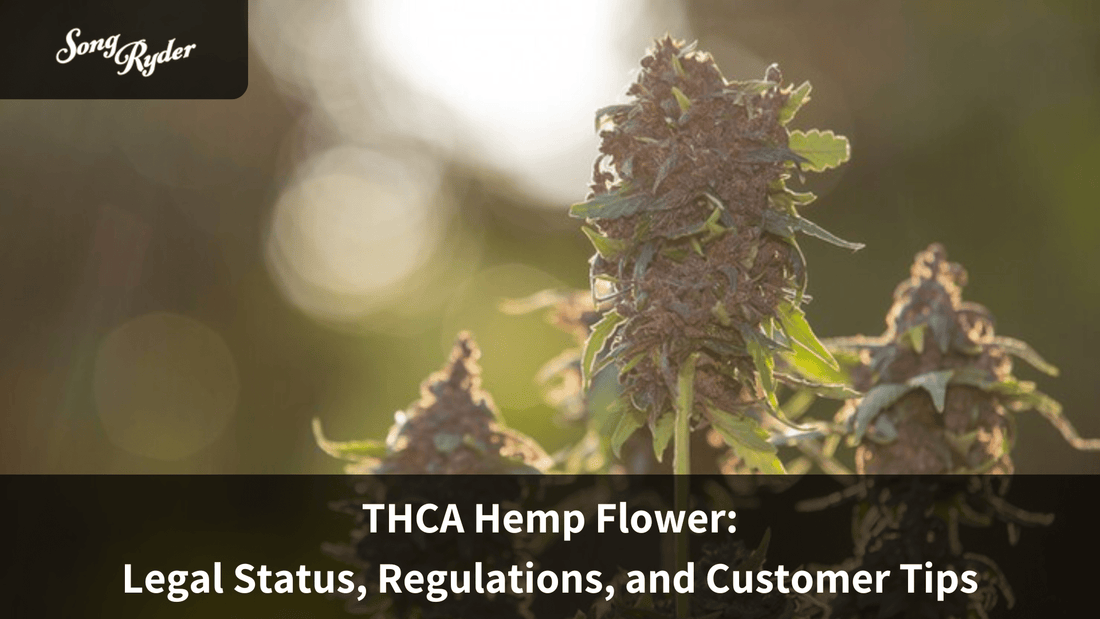
THCA Hemp Flower: Legal Status, Regulations, and Customer Tips
Share
THCA (tetrahydrocannabinolic acid) hemp flower has become increasingly popular in the cannabis community. This cannabinoid is found in raw hemp and cannabis plants and is the precursor to THC, the compound commonly associated with marijuana.
However, unlike THC, THCA in its raw form does not produce psychotropic effects, making it a subject of interest for many customers seeking non-intoxicating cannabis products.
In this article, we will explore the legal status of THCA hemp flower, and the regulations surrounding its sale. We will also provide customer tips for buying and using THCA products.
What is THCA Hemp Flower?

THCA (tetrahydrocannabinolic acid) is a non-psychoactive cannabinoid found in raw cannabis plants, including hemp. However, when THCA is heated through smoking, vaping, or cooking, it undergoes a process called decarboxylation, which converts it into THC, creating psychotropic effects.
THCA hemp flower refers to raw cannabis buds rich in THCA. It may contain low levels of Delta-9 THC (the primary compound in cannabis). Many individuals are drawn to THCA hemp flower for its potential benefits without the immediate psychotropic effects of THC.
Hemp flower and CBD are related but differ in their form and composition. Hemp flower is the raw, unprocessed bloom of the hemp plant, rich in various cannabinoids, including CBD (cannabidiol), along with terpenes and flavonoids. CBD, on the other hand, is an isolated compound extracted from the hemp flower or other parts of the plant.
Legal Status of THCA Hemp Flower
Understanding the THCA hemp flower legal status can be confusing due to overlapping state and federal laws. Here is a breakdown of its legal standing -
1) Federal Legality
Under the 2018 U.S. Farm Bill, hemp and its derivatives are federally legal as long as they contain less than 0.3 percent Delta-9 THC by dry weight. Since THCA itself falls within this legal framework, THCA hemp flower is technically legal at the federal level, provided the Delta-9 THC content remains below the 0.3% threshold.
However, because THCA converts into THC when heated, it introduces legal complexities. In its raw form, THCA hemp flower is compliant, but once decarboxylated into THC, it may produce effects that may fall under stricter marijuana laws in certain states.
2) State-Level Legality
At the state level, laws surrounding cannabis and its compounds vary widely. Some states have fully legalized cannabis, while others still have strict prohibitions against THC. While THCA hemp flower may be federally legal, individual states may have different regulations.
For example, some states classify any product that can convert to THC, such as THCA, under the same regulations as marijuana. Therefore, even though the product may meet federal hemp regulations, state laws could treat it as a controlled substance.
Key Regulations for THCA Hemp Flower

Given the complexities of THCA hemp flower's legal status, several important regulations impact its sale -
1) THC Limits
The most critical regulation for THCA hemp flower is the Delta-9 THC content. According to the Farm Bill, hemp products must contain less than 0.3% Delta-9 THC. Exceeding this threshold would classify the product as marijuana, making it subject to stricter regulations or outright illegal in many states.
To comply with federal law, reputable retailers provide third-party lab testing to verify that their products meet this THC limit. These tests are essential for ensuring the product remains legally compliant.
2) Labeling Requirements
Some states require hemp and cannabis products to include clear labeling that details the cannabinoid content, including THCA and THC levels. Proper labeling helps customers understand what they are purchasing and ensures they can make informed decisions about their use.
Inaccurate labeling or failure to disclose cannabinoid content can result in legal consequences for manufacturers and sellers, as well as potential safety risks for customers.
3) Shipping Restrictions
Shipping THCA hemp flower across state lines can also be problematic due to varying state laws. While it is federally legal, some states may restrict or prohibit the shipment of hemp products, especially those that contain THCA. Retailers often display warnings regarding shipping limitations to avoid sending products to states with stricter cannabis laws.
4) Age Restrictions
Many states and retailers enforce age restrictions on the purchase of THCA hemp flower and other cannabis-derived products. Typically, customers must be at least 21 years old to purchase these products, even in states where cannabis is legal.
Customer Tips for Buying THCA Hemp Flower

If you are considering buying THCA hemp flower, being informed about the product and its legal implications is essential Here are some helpful tips to ensure a safe and legal purchasing experience -
1) Understand Your Local Laws
Before purchasing, research the cannabis laws in your state or local area. While THCA hemp flower may be federally legal, state-specific regulations can vary widely. Understanding the legality of THCA in your area will help you avoid legal issues and ensure compliance with local laws.
2) Buy From Reputable Sellers
Choose retailers who specialize in hemp and cannabis products and offer transparency about their sourcing and testing procedures. Look for companies that provide third-party lab results verifying the cannabinoid content of their products, like Song Ryder. These tests will confirm whether the product meets legal THC limits and ensure you are receiving a high-quality, safe product.
3) Check for Lab Testing
Third-party lab tests are crucial when purchasing THCA hemp flower. These tests ensure the product complies with federal THC limits, providing peace of mind that your purchase is legal. Lab reports also give you valuable information about the cannabinoid and terpene profiles of the product, helping you choose the right strain for your needs.
4) Understand How It Works
If you are new to THCA hemp flower, it is essential to understand how it works. While the raw hemp flower contains THCA, applying heat (such as by smoking or vaping) will convert the THCA into THC, potentially producing wellness effects. You should know this transformation to avoid unexpected results.
Conclusion: Top Insights for THCA Hemp Flower
THCA hemp flower offers a unique experience for cannabis customers, with its non-psychotropic properties in raw form and potential conversion to THC when heated. However, navigating the legal landscape around THCA can be tricky due to its complex regulatory status. By understanding local laws, purchasing from reputable sources, and ensuring compliance with regulations, customers can enjoy THCA hemp flower safely and legally.
Check out premium hemp and cannabis products at Song Ryder! From top-quality Hemp Flower, Smokeables, and Pre-Rolled Joints to THCA and Delta 8-THC vapes, we have everything you need. Shop now and enjoy the best of hemp and THC products!
Frequently Asked Questions
1) Is THCA hemp flower legal in all states?
No, while THCA hemp flower is federally legal under the 2018 Farm Bill, its legal status varies by state. Some states may classify THCA under the same regulations as THC-rich marijuana, making it illegal. Ensure your purchase is legal in your area before making a purchase.
2) Can I ship THCA hemp flower across state lines?
Shipping THCA hemp flower across state lines is legal at the federal level, but some states may restrict or prohibit the shipment of hemp products. Always check state laws before placing an order to ensure compliance.
3) How do I know if my THCA hemp flower is legal?
To ensure the legality of your THCA hemp flower, check for third-party lab tests that confirm the product contains less than 0.3% Delta-9 THC by dry weight. Reputable sellers should provide this information.
4) Is THCA the same as THC?
No, THCA is the non-psychotropic precursor to THC. It only becomes THC when exposed to heat through a process called decarboxylation. THCA and THC have different wellness effects and properties.
